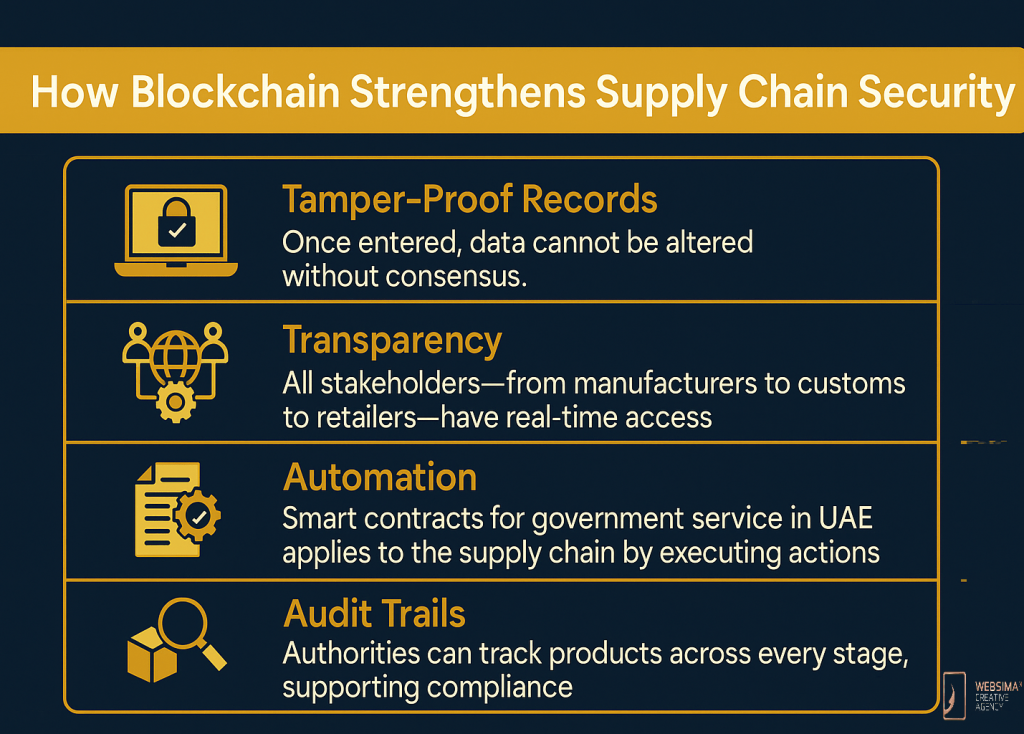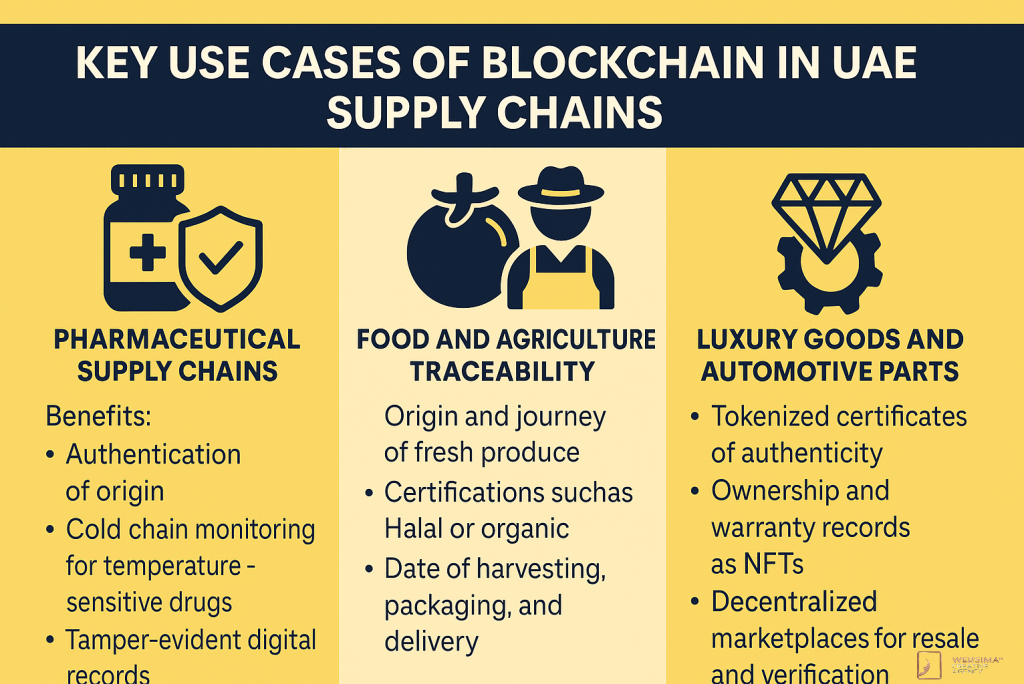Introduction: Why Blockchain is Critical for UAE’s Supply Chain Resilience
The United Arab Emirates (UAE) is a global logistics and trade hub. With its ports, free zones, and strategic location bridging East and West, the country handles vast volumes of cargo across industries—from oil and gas to food, pharmaceuticals, electronics, and luxury goods. But with complexity comes vulnerability. Supply chains are increasingly threatened by fraud, counterfeiting, lack of transparency, and inefficient tracking. To address these challenges, the UAE is turning to blockchain technology. By offering immutable, transparent, and secure tracking across every stage of the supply chain, blockchain is fast becoming a cornerstone of digital transformation. As a result, blockchain for supply chain security UAE is no longer a futuristic concept—it’s a real-time solution actively implemented across sectors.
This article explores how blockchain development in Dubai is reshaping supply chain security in the UAE and what businesses, investors, and logistics providers must know to leverage it effectively.
Why Supply Chain Security Matters in the UAE
WCO Smart Customs Project conducts first national study mission on blockchain technology in Abu Dhabi, United Arab Emirates
https://t.co/ykkEHjNebK#WCO #Customs #SmartCustoms #DisruptiveTechnologies #Blockchain #eCommerce @AbuDhabiCustoms pic.twitter.com/JPY1kIQJlN— World Customs Organization (@WCO_OMD) May 12, 2025
Supply chains are the backbone of the UAE’s diversified economy. The country ranks among the top 20 globally in logistics performance, with Dubai’s Jebel Ali Port and Abu Dhabi’s Khalifa Port serving as regional trade gateways. But with great throughput comes significant risk:
- Counterfeit Goods: High-value items such as medicines, auto parts, and electronics are frequent targets for fraud.
- Lack of Visibility: Multi-modal shipments often move across disconnected systems.
- Delays and Disruptions: Manual documentation and customs clearance create bottlenecks.
- Regulatory Compliance: Global trade demands full traceability, especially in sensitive industries like food and healthcare.
The need for end-to-end visibility, automation, and accountability has never been more pressing.
How Blockchain Strengthens Supply Chain Security
: &
People, listen this is very important to consider. Because port employees need to understand that your job is not just about shipping products. We all know you will not have the courage to report what has been actually… pic.twitter.com/suSzYFBIPi
— ȺɾìҽӀ (@Prolotario1) October 2, 2024
Blockchain’s value lies in its ability to provide a decentralized, immutable ledger of transactions. Every change in the supply chain—whether it’s a product handoff, quality check, or customs approval—is recorded as a time-stamped digital block.

Key benefits for UAE supply chains include:
- Tamper-Proof Records: Once entered, data cannot be altered without consensus.
- Transparency: All stakeholders—from manufacturers to customs to retailers—have real-time access.
- Automation: Smart contracts for government service in UAE applies to the supply chain by executing actions automatically (e.g., release of goods upon payment).
- Audit Trails: Authorities can track products across every stage, supporting compliance.
For a country like the UAE, which operates at the intersection of global trade routes, blockchain ensures trust, speed, and efficiency.
Government-Led Blockchain Supply Chain Initiatives in the UAE
The UAE government has launched multiple initiatives to integrate blockchain into public-sector logistics and trade.
Dubai Customs Blockchain Pilot
Dubai Customs has piloted a blockchain-based project to enhance cargo tracking and clearance.
Key outcomes:
- Real-time data synchronization between traders and regulators
- Seamless integration with ports and free zones
- Reduced paperwork and clearance delays
UAE Blockchain Strategy 2021
As part of its national Blockchain Strategy, the UAE aims to conduct 50% of government transactions using blockchain. Using blockchain in Dubai’ Logistics industry as well as customs are key focus areas.
Emirates SkyCargo Blockchain Platform
Emirates SkyCargo, the air freight division of Emirates, has been using blockchain to improve cargo documentation, shipment verification, and real-time tracking.
These projects highlight how blockchain supply chain security UAE is driven by both top-down innovation and private sector partnerships.
Key Use Cases of Blockchain in UAE Supply Chains

Pharmaceutical Supply Chains
Pharmaceutical counterfeiting is a global issue. In the UAE, blockchain is being used to trace the entire lifecycle of medications—from manufacturer to pharmacy shelf.
Benefits:
- Authentication of origin
- Cold chain monitoring for temperature-sensitive drugs
- Tamper-evident digital records
Healthcare authorities can instantly verify compliance and detect anomalies.
Food and Agriculture Traceability
Dubai’s position as a major importer of food products demands transparency. Blockchain helps track:
- Origin and journey of fresh produce
- Certifications such as Halal or organic
- Date of harvesting, packaging, and delivery
This reduces food waste, prevents fraud, and enhances consumer confidence.
Luxury Goods and Automotive Parts
Luxury goods (watches, bags, jewelry) and automotive components are frequent targets for counterfeiting. Blockchain enables:
- Tokenized certificates of authenticity
- Ownership and warranty records as NFTs
- Decentralized marketplaces for resale and verification
These applications protect brands and buyers alike.
Integrating Blockchain with IoT and AI in the UAE
Blockchain’s capabilities multiply when combined with Internet of Things (IoT) and Artificial Intelligence (AI):
- IoT sensors in shipping containers can log temperature, location, and shock data directly onto the blockchain.
- AI algorithms can analyze blockchain data to predict disruptions, optimize inventory, or detect suspicious patterns.
For example, Dubai’s ports have begun trials of AI-enabled predictive maintenance systems with blockchain-stored performance data. This improves asset uptime and reduces operational risk.
Challenges to Blockchain Supply Chain Adoption
Despite the benefits, blockchain supply chain security UAE still faces hurdles:
- Integration Complexity: Many logistics firms rely on legacy systems.
- Data Standardization: Blockchain requires uniform data formats across the ecosystem.
- Initial Cost of Implementation: Custom blockchain solutions can be expensive.
- Regulatory Alignment: Harmonizing laws across borders is still evolving.
To mitigate these challenges, UAE-based companies are turning to blockchain development partners who specialize in API integrations, compliance, and network design.
Private Sector Adoption: How UAE Businesses Are Using Blockchain
Several major companies in the UAE have taken the lead in blockchain-powered supply chain systems:
- DP World partnered with TradeLens (a Maersk–IBM blockchain project) to digitize trade lanes and customs procedures.
- Etisalat uses blockchain for smart warehouse tracking and identity verification in logistics.
- ADNOC (Abu Dhabi National Oil Company) launched a blockchain pilot to track oil production, movement, and delivery.
These real-world implementations are helping the UAE transition from pilot programs to scalable blockchain ecosystems.
Benefits for SMEs and Local Traders
Small and medium-sized enterprises (SMEs), which make up 94% of UAE companies, can also benefit:
- Affordable supply chain finance via tokenized assets
- Improved supplier trust through verified transaction histories
- Easier compliance with export/import regulations
Several blockchain consortia in the UAE now offer plug-and-play platforms for SMEs to participate without building custom infrastructure.
The Role of Blockchain in ESG and Sustainability Reporting
The UAE has committed to becoming net-zero by 2050, and blockchain is playing a key role in tracking sustainable sourcing and carbon credits.
Blockchain-enabled supply chains can:
- Record environmental impact metrics (emissions, water use, energy)
- Tokenize green certifications and carbon offsets
- Provide transparency for ESG audits
This allows UAE companies to enhance sustainability disclosures while meeting the expectations of international stakeholders.
Future Outlook: UAE as a Global Blockchain Logistics Leader
The UAE’s leadership in logistics, combined with its tech-forward governance, makes it well-positioned to become a global center for blockchain-powered supply chains.
Emerging developments include:
- Blockchain-linked free trade zones with end-to-end digital customs
- Integration of national digital ID systems with supply chain records
- Use of interoperable cross-border blockchain networks for international trade
- Expansion of digital twin tracking for containers and cargo
As these initiatives unfold, the importance of blockchain supply chain security UAE will only grow—impacting industries from energy to retail.
Build Your Blockchain Supply Chain Solution with Websima
At Websima, we empower logistics companies, import/export businesses, and government stakeholders in the UAE to develop custom blockchain solutions that strengthen supply chain security and transparency.
Our Specialized Services Include:
- Development of blockchain-based traceability platforms
- Integration of IoT and real-time sensors for automated data logging
- Creation of NFT authentication systems for luxury goods and equipment
- Smart contract deployment for trade finance and supplier payments
- Compliance solutions aligned with UAE blockchain strategies and global standards
We build future-ready supply chain systems that are scalable, secure, and compliant. Whether you’re a multinational logistics provider or a fast-growing trading firm, Websima delivers blockchain innovation tailored to your operational needs.
Contact Websima today to explore how we can help you secure your supply chain with blockchain in the UAE.





